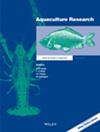Fabrication of Algogenic Zinc Nanoparticles and Assessment of Their Biomimetics Attributes and Potential Antibacterial Efficacy Against Fish Pathogens
Abstract
This study investigates the fabrication of algogenic zinc nanoparticles (ZnNPs), examining their biomimetic properties and potential antibacterial effectiveness against fish pathogens. The rising incidence of antibiotic resistance in aquaculture demands innovative strategies for disease management, highlighting the importance of developing biocompatible and effective antimicrobial agents. In this context, ZnNPs were synthesized using Pediastrum boryanum microalgal extract as the reducing and capping agent. Transmission electron microscopy (TEM) revealed spherical and tetragonal particles with sizes ranging from 32.84 to 26.87 nm. Fourier transform infrared spectroscopy (FTIR) demonstrated distinctive functional groups in the algal extracts and ZnNPs. X-ray diffraction (XRD) showed pure crystallinity of the fabricated ZnNPs with an average crystalline size of 57.97 nm. The algal extract had high total phenolic (TPC) and flavonoid (TFC) contents (TPC: 53.83 and TFC: 12.44 mg QE/g, respectively). The obtained ZnNPs retained a considerable amount of TPC and TFC (7.92 and 5.31 mg/g, respectively). The microalgal extract and ZnNPs exhibited considerable antioxidant capacity in the 2,2-Diphenyl-1-picrylhydrazyl (DPPH) radical scavenging assay. In addition, they elicited antibacterial efficacy against several bacterial pathogens in fish in a minimum inhibitory concentration (MIC) assay. Brine shrimp lethality assay (BSLA) revealed higher potential cytotoxicity of biosynthesized ZnNPs at 29.28 μg/mL compared to that of the algal extracts at 51.56 μg/mL. These findings highlight the potential of P. boryanum as a green factory for the nanofabrication of metallic nanoparticles (NPs) and as a promising clinical candidate for fish medicine.


 求助内容:
求助内容: 应助结果提醒方式:
应助结果提醒方式:


